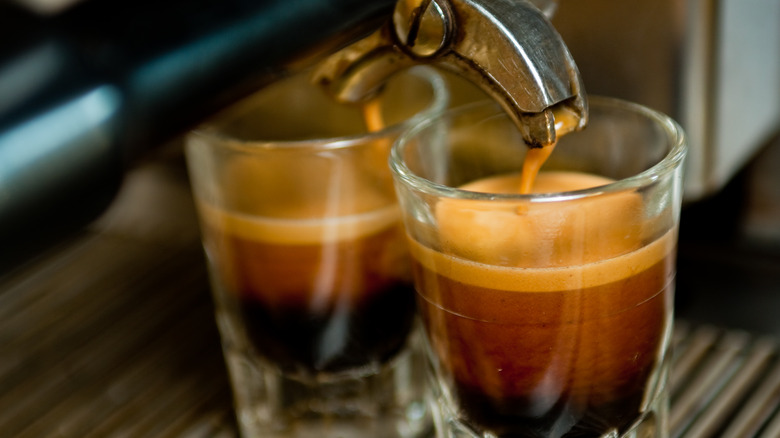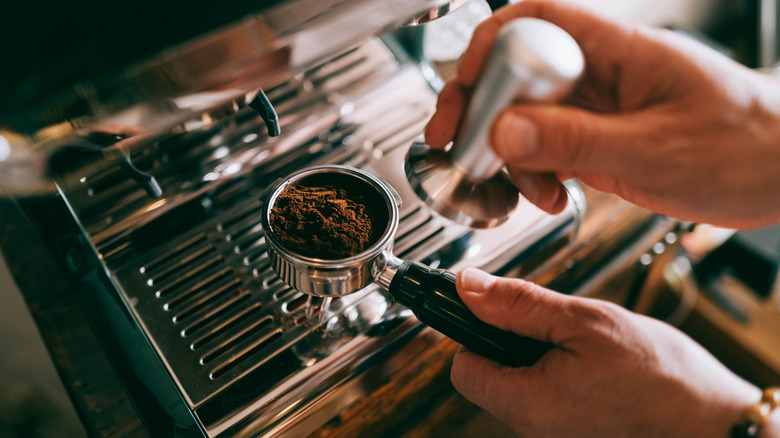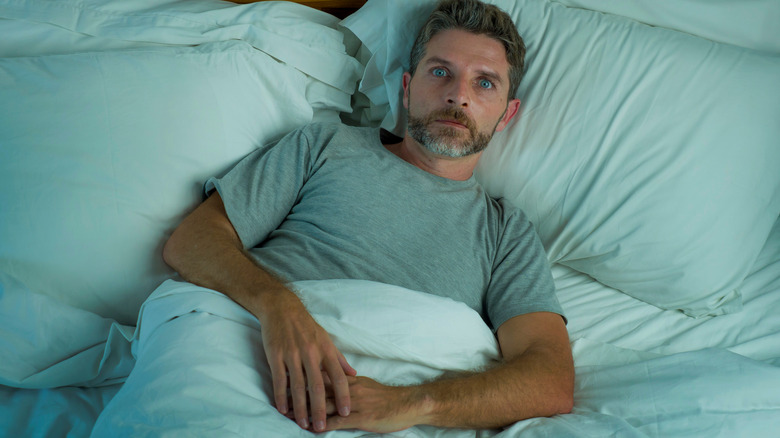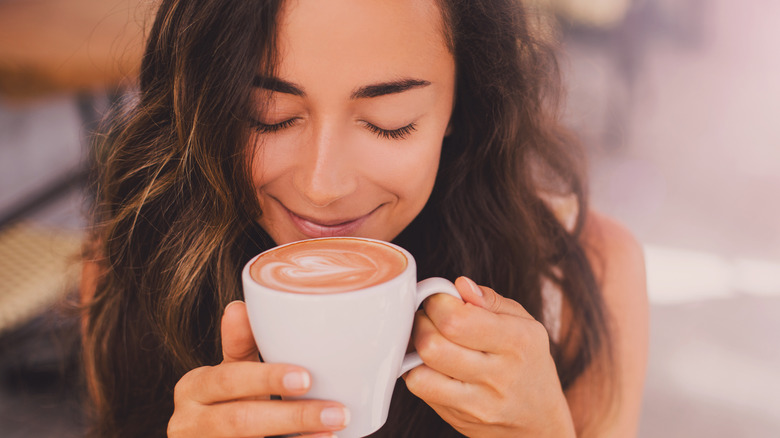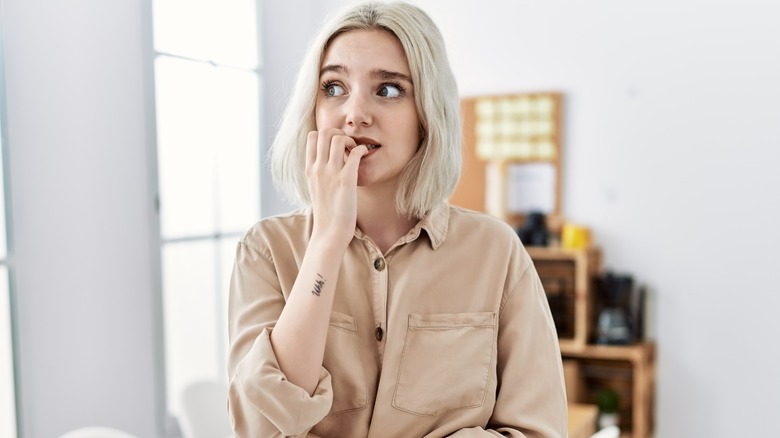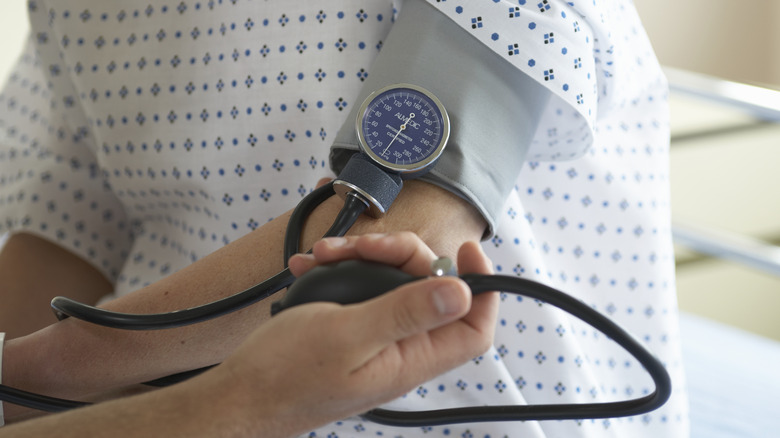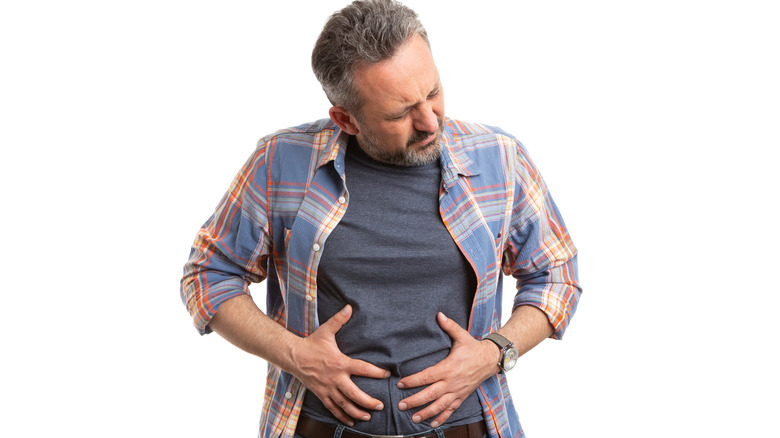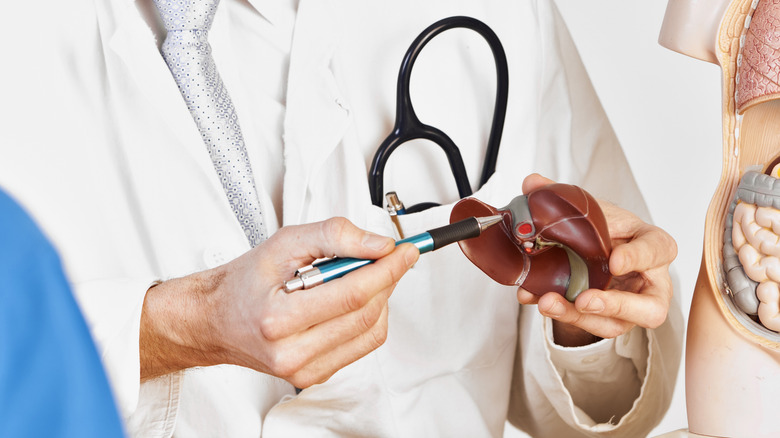Here's What Happens When You Drink Espresso Every Day
Is there any beverage more popular than coffee? With the very likely exception of, say, plain old water — which barely qualifies as a drink selection, given it's a necessity for human survival and all — it's hard to imagine any consumable liquid superior to coffee. In fact, given an astronomical 22 billion pounds of coffee was consumed worldwide in 2021, it's patently clear no one's tiring of their morning java — whether it's a cream-and-sugar-filled Frappuccino or a piping-hot shot of espresso.
Espresso is a dream come true for the coffee connoisseur. Created by Luigi Bezzera and Desiderio Pavoni (who introduced the world to their single-shot espresso machine at the 1906 Milan Fair in Italy), the potently-caffeinated beverage is a marvel — and a hit with modern U.S. consumers. Of course, the enormous popularity of espresso-based coffee drinks in the U.S. makes us wonder how the big, bold Italian import affects human health, particularly among those who drink espresso on a daily basis.
While the unbeatable bang-for-your-buck caffeine content of caffè espresso explains its enduring appeal, the potential concerns (or possible benefits) from consistently consuming this type of coffee are less apparent. If you're wondering how sipping espresso every morning (and afternoon) may impact your overall health — for better or worse – we've got you covered. Without further ado, here's what happens when you drink espresso every day.
How much caffeine is in espresso?
Setting aside the chemistry and craftsmanship behind espresso (that's for a different article), the main factor to consider when discussing espresso's potential health impact is its caffeine content (at least before any additional fat or sugar is added). So if you're wondering what happens when you drink espresso every day, it's instructive to start by knowing one ounce of it contains an average of 63 milligrams of caffeine.
Now, sans context, that number doesn't reveal a whole lot of information. But when you consider a standard cup of drip coffee contains a meager 12 to 16 milligrams of caffeine per ounce, you don't need to be a mathematician to recognize espresso drastically outperforms the alternative when compared side-by-side in terms of caffeine content.
Interestingly, though, when you compare a standard serving of espresso (generally one to two ounces) to a standard cup of coffee (which likely measures eight ounces or so), there's actually less caffeine in the average serving of espresso than that of regular coffee. It's true that a direct, pound-for-pound measurement favors espresso. But when you factor in the standard serving sizes, there's little reason to believe espresso will impact you any differently than regular drip coffee (unless you're regularly slugging an exorbitant number of espresso shots, that is).
How many cups of espresso can you safely drink in one day?
Perhaps unsurprisingly, how many cups of espresso a person can safely drink on any given day is all about the caffeine content. With that in mind, there's no safe limit for daily cups of espresso, per se, but rather a maximum recommended amount of caffeine: roughly 400 milligrams per day for the average adult, per the Mayo Clinic. Of course, since one ounce of espresso contains 63 milligrams of caffeine, the powers of basic division reveal the average person can safely consume just over six ounces of espresso each day (or precisely 6.35 ounces).
Does this mean you should be pouring yourself a sextuple shot of espresso before leaving the house each morning? Of course not. After all, the 400-milligram estimate considers a person's entire day from start to finish — not simply the morning time. Additionally, other individualized factors need to be taken under consideration when deciding how much caffeine (and, consequently, espresso) is safe for a person to ingest during the day, as well.
Folks known to be sensitive to caffeine, for instance, will want to lower their intake, as will children under 18. And while pregnant women don't need to avoid caffeine (or espresso) entirely, it is recommended they limit their caffeine to 200 milligrams or less per day — meaning a pregnant woman can drink up to three ounces of espresso without drastic fear (via Harvard University).
It may make you feel more alert and energized
"Drinking espresso gives you an energy boost" is the type of sentence we'd write if we were eager to impress voters for the Most Obvious Statements of All Time awards (those awards don't exist). Of course, the notion that caffeine causes an uptick in one's overall alertness and energy levels is as well-known as any fact could be. In other words, is it really a surprise to discover this uber-caffeinated coffee variety provides a substantial burst of energy when consumed?
The precise mechanisms that allow caffeine to enhance one's energy levels are fairly complex (physiologically-speaking). But without diving too deeply into the underlying chemistry, it's helpful to know that caffeine (like the 63 milligrams found in each ounce of espresso) raises cortisol levels in the body — which, in turn, can raise one's feelings of alertness in the short term.
Additionally, the intense caffeine boost in espresso can be monumentally beneficial before exercising. Since espresso won't fill you up (or leave a jiggly, gurgling mass of extra water in your stomach), you'll be able to use that energy burst to work out harder and maximize the overall benefits.
Espresso can cause insomnia depending on when you drink it
What would you say is the most widely-known and understood effect of caffeine on the human body? We'll answer for you: it's the fact that caffeine (and any beverage that contains caffeine, like espresso) is a stimulant. That's the main reason behind coffee's A.M. powerhouse status, after all. Of course, while espresso makes for a fantastic morning choice, if you're drinking espresso too late in the day, you might find yourself battling a case of insomnia as a result, according to the Mayo Clinic.
Now, whether or not your daily espresso shot(s) will lead to you lying in bed awake all night is dependent on several factors — mainly how soon before bed you drink it. Since caffeine has an average half-life of five hours, it takes an average of five hours for the effects of caffeine to wear off in the body (and can take up to 9.5 hours for certain individuals).
In other words, if you drink espresso too soon before trying to go to sleep, there's a decent chance you'll struggle to doze off. So do yourself a favor, and skip any espressos after the early afternoon.
Your overall mood could brighten
"I'm not me before my morning coffee" isn't just a tired cliché. It also helps illustrate one of the greatest (and most widely-known) potential benefits one can reap from drinking espresso — that caffeine is known to lift the spirits. In that sense, when you drink espresso every day, you're apt to find your overall mood improved.
While daily ingestion of caffeine (and espresso) can undoubtedly elevate an individual's mood, it's not a more-is-more situation. After all, while a 1994 study showed that consuming 200 to 250 milligrams of caffeine (roughly three to four ounces of espresso) can boost one's temperament for several hours, it appears that effect quickly tapers off with higher levels of caffeine.
Interestingly enough, increasing one's short-term happiness isn't the only possible benefit found from espresso's mood-brightening qualities. One 2015 study even demonstrated a noticeable decrease in depression levels associated with caffeine consumption — so if you're feeling blue, reach for an espresso shot.
There's a chance your anxiety may increase
It's no secret that the more caffeine a person ingests, the more their heart rate and blood pressure increases (via Medical News Today). If someone downs five shots of espresso within a five-minute span, there's a better-than-average chance that person will find themselves vibrating like a jackhammer (300 milligrams of caffeine will do that to you). More than that, though, drinking too much caffeine can lead to an increase in one's anxiety levels — particularly for those folks already dealing with a diagnosable level of anxiety.
To be clear, anyone may find themselves overcome with anxiety if they ingest too much caffeine. But the effects of drinking caffeine (and espresso) are more likely to trigger symptoms of anxiety in individuals already afflicted with the mental health disorder. More than that, the fact that, per GoodRx, many of caffeine's physical side effects mimic symptoms of anxiety can make it difficult to ascertain whether you're dealing with a simple byproduct of caffeine or a bonafide boost of anxiety — an uncertainty that may, in turn, trigger further anxious feelings, as well.
Additionally, some individuals can, in fact, find themselves afflicted with a caffeine-induced anxiety disorder, as well, according to a 2017 study. So if you find yourself white-knuckling through the day after an espresso shot, it might be best to steer clear of the beverage — at least until you've consulted with a doctor.
Your risk of stroke may be reduced
Did you know nearly 800,000 individuals have a stroke in the U.S. every year? Given this slightly ghoulish statistic, it stands to reason you'd be inclined to adopt lifestyle habits that decrease the risk you'll find yourself among that group. And since consistent coffee consumption may be linked to a substantial decrease in one's risk for having a stroke, you'll want to consider sipping espresso on the regular.
According to one long-range 2021 study, individuals who consumed two to three cups of regular coffee per day — roughly 200 to 300 milligrams of caffeine, or the equivalent of three to five ounces of espresso — over an 11-year period saw their stroke risk reduced by 32%. A different 2012 study discovered that individuals who drank four or more cups of coffee each day (equal to about six or so ounces of espresso) were less likely to suffer a stroke, as well. If you're on the fence about daily espresso consumption, consider the immensely positive impact caffeine can have on potential cardiovascular disorders.
It can cause your blood pressure to rise
Pretty much everything in modern life is prone to raising your blood pressure. Of course, while blood pressure will naturally rise and fall throughout the day, if you're predisposed to high blood pressure, you may find espresso exacerbating the problem.
Actually, no matter who you are (or your personal health profile), the stimulating effect produced by caffeine means your blood pressure will rise (at least temporarily) after drinking an espresso. But for those folks with pre-existing high blood pressure, it's not simply a matter of avoiding a brief spike in your blood pressure.
In fact, one 2022 study found individuals diagnosed with acute hypertension who drank two or more cups of caffeinated coffee per day were nearly twice as likely to die from cardiovascular disease as individuals who drank less coffee (or green tea, instead). In other words, while you may be inclined to drink espresso every day, if your blood pressure is high, you'll want to think twice before you do.
It can reduce the risk of developing diabetes
Despite the mountains of evidence debunking the many myths about coffee, some remain prominent. Case in point: the fallacy that drinking coffee — or highly-concentrated coffee beverages, such as espresso — can cause diabetes. On the contrary, drinking espresso (or any non-fat, non-sugar coffee variety) can actually lower one's risk of developing diabetes in the long run (via The American Journal of Clinical Nutrition).
The misconception that coffee (and, therefore, espresso) can raise one's blood sugar levels and lead to the development of diabetes likely comes from the various added components that may be in a person's cup. After all, while drinking a straight shot of espresso can provide a plethora of potential nutritional benefits (without spiking your blood sugar), if you load down your coffee with additional fat and sugar, it's a different story.
One additional caveat to consider is whether you already have diabetes. After all, while there's no evidence to suggest espresso causes the disease, ingesting high levels of caffeine can lead to issues for those already afflicted with the illness, per the Mayo Clinic. In other words, espresso won't give a person diabetes — but it can exacerbate the problem for a person already diagnosed.
Digestive problem such as bloating are possible for some individuals
If you've ever found yourself caressing your belly after slugging several cups of java, you realize the potential for indigestion exists with all coffee. In that regard, since espresso is a type of coffee, it, too, can be the potential source of indigestion or bloating in certain individuals — although there are several caveats to consider before you ditch espresso entirely.
For starters, there's a fairly wide pool of data to suggest the vast majority of coffee drinkers (espresso or otherwise) aren't susceptible to indigestion upon consumption. In fact, while many individuals believe coffee's acidity level is the source of any bloating or intestinal discomfort associated with the beverage, that acidity may actually aid in digestion for most individuals.
Of course, if you are one of those unfortunate individuals who feel their stomach gurgling after a sip or two of fresh coffee, espresso may offer a breath of fresh air. At the very least, espresso's smaller portion size may provide respite to someone who can't handle the eight-or-more ounces of liquid found in a standard cup of drip coffee.
Your memory may improve over time
Quick: what was the very first line in this article? Did you remember? If not, then we'd bet you aren't drinking espresso every day — and would suggest you consider it. But caffeine doesn't just cause an immediate increase in one's alertness upon ingestion. In fact, if you drink a certain amount of espresso (and the caffeine therein) every day, there's an excellent chance you won't forget to keep doing so in the future — because your memory might have improved.
Researchers have "always known that caffeine has cognitive-enhancing effects," as Michael Yasa (an assistant professor of psychological and brain sciences at John Hopkins) said in 2014 – a belief that was strengthened after a study that year revealed "a specific effect ... on reducing forgetting over 24 hours." An additional study in Front Psychology indicated that caffeine (and espresso) can also improve memory performance in young adults at the time of day they're least likely to be at their sharpest.
As with any potential benefit provided by espresso consumption, there's no guarantee the beverage will hone your memory. But with little reason to expect it will have a negative impact, there's no reason you should forget about drinking espresso every day.
It won't lead to dehydration or weight loss (by itself)
As we noted several times throughout this article, there's a number of common misconceptions surrounding espresso's potential impact on the body. For instance, when it comes to coffee and espresso, many incorrectly presume it leads to dehydration and triggers weight loss. But espresso is not, in fact, a dehydrating beverage, and it won't cause you to lose weight — or, rather, it won't trigger weight loss all on its own over the long run.
Now, while the evidence is quite clear regarding whether coffee is dehydrating (it isn't, per this PLOS One study), it's less straightforward when it comes to weight loss. For instance, the energizing effect of espresso (via its caffeine) is known to be a great pre-workout performance enhancer, which, in turn, can lead to a greater drop in weight loss over time. Additionally, if you've never consumed caffeine with any sort of consistency, you may, in fact, temporarily boost your metabolism — thus triggering fat loss (via Healthline).
However, any rise in metabolism appears to diminish once the body develops a tolerance to caffeine. Consequently, you shouldn't expect to lose weight solely from drinking espresso every day — but it won't stifle anyone's weight loss journey, either.
It could lower your risk for certain liver diseases
No matter who you are or where you come from, there's no avoiding the fact that, sooner or later (hopefully later), we all pass away. Of course, while we're all on our way out, there are certain steps we can all take to reduce our chance of developing a debilitating illness or disorder while staving off mortality. With that in mind, if you're hoping to reduce your risk of certain liver diseases, you may want to consider drinking espresso every day (via Discover Magazine).
Without presenting coffee as some sort of magical liquid, the (potentially) beneficial nature of coffee on the liver is really quite stunning. Studies have shown coffee (in any form, including espresso) can lower the risk of certain liver cancers, specific liver disorders (including cirrhosis), and may even reduce the advancement of liver disease in those already dealing with an issue.
Clearly, the liver's importance to human health isn't more vital than any other organ, but it is uniquely necessary. You can't expect your body to filter out the numerous toxic substances you're prone to ingest without a functioning liver, after all. So for anyone eager to avoid having chopped liver inside their body, don't skip the espresso.
